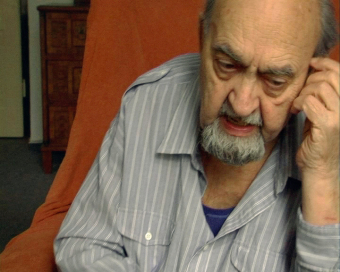Jiří Pavel (*1926)

© Fritz Bauer Institute
Jiří Pavel, the second of the three sons of Leo and Hermína Popper (the family name was changed to Pavel in 1952), was born in Pilsen on March 24, 1926. He was deported in 1943 with his older brother, Hugo (born in Mariánské Lázně in 1924). His younger brother, Ota (born in Prague in 1930, died there in 1973), became a famous Czech writer, whose books have been translated into several world languages.
Jiří Pavel’s Jewish father married the “Aryan” servant girl from his grandparents’ farm. The family lived in the Christian social world. The father was a successful vacuum cleaner salesman, employed by Electrolux. After the German occupation in 1939, the family moved to Buštěhrad because of the effect of the Nazis’ racial policies on the Jewish grandparents. There Jiří Pavel continued his schooling, but the Germans’ anti-Semitic policy kept him from graduating from high school. It was the German occupation that first made the boys aware of their Jewish ancestry. Their parents had registered Jiří and Hugo after birth with the rabbinate as members of the Jewish faith. According to the Nuremberg Laws, they were “of mixed blood,” Mischlinge of the second degree, and therefore they were deported with the last transport to Terezín (Theresienstadt) on March 6, 1943. They had spent the two previous weeks in a transit camp in Prague. The youngest brother, Ota Pavel, was considered a Mischling of the third degree, as he had not been registered as a Jew after birth, and he was allowed to stay at home. The father was also protected from deportation by his “Aryan” wife.
To keep Jiří from being sent to the Auschwitz concentration camp, Hugo signed up for a labor brigade that worked in the armaments industry in Germany. Nevertheless, Jiří Pavel was sent to Auschwitz on October 28, 1944. The brothers had to part ways, and they did not see each other again until they returned home after the war’s end. After a few weeks in Auschwitz, in mid-November 1944, the SS sent Jiří with a group of lathe operators to the Buna/Monowitz concentration camp, where he was made to do forced labor until the end of the year. When the Red Army was approaching, Jiří Pavel and other prisoners were transported to the Sosnowiec (Sosnowitz) subcamp. He was held there for a week, while preparations for the death march were being made. Guarded by German soldiers—not by the SS—the inmates set out on the death march to Opava (Troppau), in the course of which half the prisoners died or were murdered. From Opava, the surviving prisoners were taken in half-open freight cars to Mauthausen. From the Mauthausen train station, they had to walk a long way on zigzag roads to reach the Mauthausen concentration camp. There Jiří Pavel found good friends, who saved his life. After liberation by the U.S. Army on May 5, 1945, Jiří Pavel left the camp with a friend to ask for food at the surrounding farms. After some time, they were taken back to Prague by truck.
Jiří Pavel went back home, where he found his entire family. After the war ended, the family moved back to Prague. In the months that followed, Jiří Pavel enjoyed life, celebrating and traveling here and there, but he also realized what he had experienced and was aware that he, unlike many others, was still alive.
Jiří Pavel finished his high school education, and in 1970 he received a degree in journalism from the Charles University in Prague. He could not get enthusiastic about this work, however, and since then he has been a dealer in antiques. Today he lives with his daughter in Prague.
(KH; transl. KL)
Jiří Pavel, oral history interview
(Czech, with German subtitles)
















